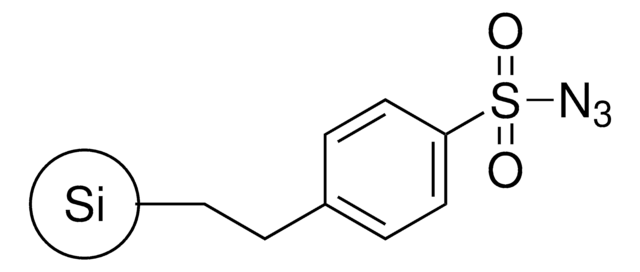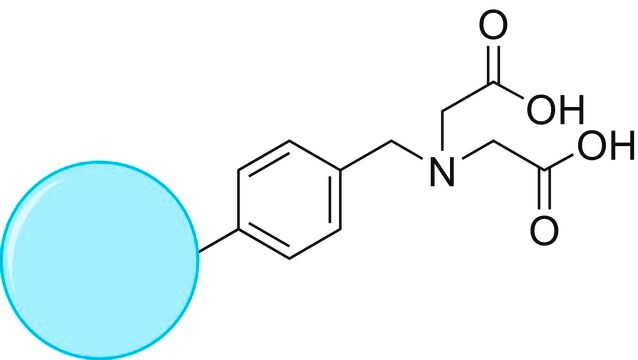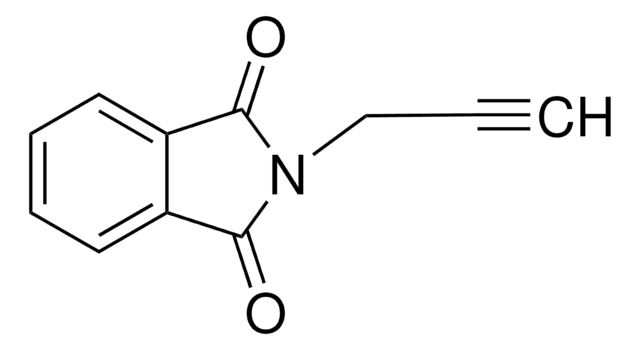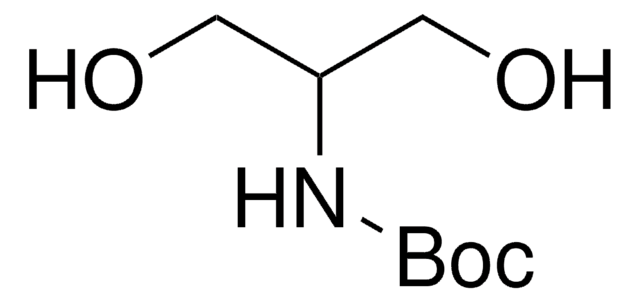742627
TurboBeads™ Azide
extent of labeling: ≥0.1 mmol/g loading (-Ph-CH2-N3)
Synonym(s):
Nano particles, magnetic, azide functionalized
Sign Into View Organizational & Contract Pricing
All Photos(1)
About This Item
UNSPSC Code:
12352200
NACRES:
NA.22
Recommended Products
product line
TurboBeads™
Assay
≥99%
form
powder
composition
carbon content, ≤14 wt. %
reaction suitability
reaction type: solution phase peptide synthesis
extent of labeling
≥0.1 mmol/g loading (-Ph-CH2-N3)
magnetization
≥120 emu/g, mass saturation
surface area
≥15 m2/g
average diameter
≤50 nm
suitability
conforms to structure for Infrared spectrum
Packaging
Bottomless glass bottle. Contents are inside inserted fused cone.
Analysis Note
Proof of identity: metallic cobalt identity from XRD
air-stability:
weight gain in air at 400°C >20 wt.%
weight gain in air at 100°C <3 wt.%
air-stability:
weight gain in air at 400°C >20 wt.%
weight gain in air at 100°C <3 wt.%
Legal Information
TurboBeads is a trademark of TurboBeads LLC
Storage Class Code
11 - Combustible Solids
WGK
WGK 3
Flash Point(F)
Not applicable
Flash Point(C)
Not applicable
Choose from one of the most recent versions:
Already Own This Product?
Find documentation for the products that you have recently purchased in the Document Library.
Jacinto Sá et al.
Nanoscale, 5(18), 8462-8465 (2013-07-12)
Non-magnetic Pt catalysts, supported on carbon coated magnetic Co nanoparticles, changed catalytic performance in the presence of an external magnetic field. This behavior relates to an electronic change of Pt induced by a localized magnetic field, which modifies the CO
Quirin M Kainz et al.
Chemistry (Weinheim an der Bergstrasse, Germany), 19(30), 10038-10045 (2013-06-19)
Unprecedented magnetic borohydride exchange (mBER), magnetic Wang aldehyde (mWang) and magnetic amine resins were prepared from highly magnetic polymer-coated cobalt or iron nanoparticles. Microwave irradiation was used to obtain excellent degrees of functionalization (>95 %) and loadings (up to 3.0 mmol g(-1))
Hideya Kawasaki et al.
Analytical chemistry, 84(21), 9268-9275 (2012-09-29)
Graphene-coated cobalt nanoparticles surface-functionalized with benzylamine groups (CoC-NH(2) nanomagnets) were shown to effectively enrich analytes for surface-assisted laser desorption/ionization mass spectrometry (affinity SALDI-MS) analysis. These CoC-NH(2) nanomagnets are highly suited for use with affinity SALDI-MS because their mean diameter of
Inge K Herrmann et al.
Nanoscale, 5(18), 8718-8723 (2013-08-01)
In a number of clinical conditions such as intoxication, bacteraemia or autoimmune diseases the removal of the disease-causing factor from blood would be the most direct cure. However, physicochemical characteristics of the target compounds limit the applicability of classical filtration
Vladimir Zlateski et al.
Bioconjugate chemistry, 25(4), 677-684 (2014-03-29)
In the pursuit of robust and reusable biocatalysts for industrial synthetic chemistry, nanobiotechnology is currently taking a significant part. Recently, enzymes have been immobilized on different nanoscaffold supports. Carbon coated metallic nanoparticles were found to be a practically useful support
Our team of scientists has experience in all areas of research including Life Science, Material Science, Chemical Synthesis, Chromatography, Analytical and many others.
Contact Technical Service








![7-Diethylamino-3-[N-(2-maleimidoethyl)carbamoyl]coumarin suitable for fluorescence, BioReagent, ≥97.0% (HPLC)](/deepweb/assets/sigmaaldrich/product/structures/341/038/a7e0c464-8abe-4eb0-b253-6537f649d89c/640/a7e0c464-8abe-4eb0-b253-6537f649d89c.png)